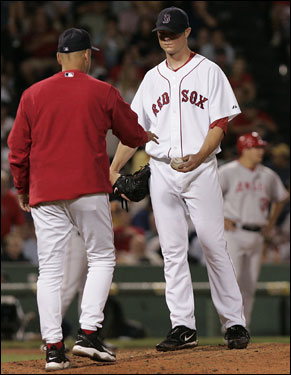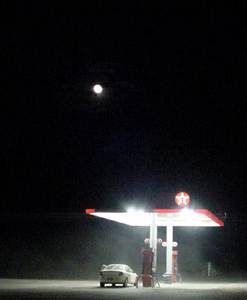Scattered Thoughts
on Heavy Themes

Actually, let's start out light:
Chicago Tribune's Joel Stein feels bad for David Hasselhoff.
Speaking of a guy who gets wrapped up in the persona he creates, here's a long piece from LA Times "West" Magazine about the guy who invented Girls Gone Wild.

Girls Gone Wild founder Joe Francis with … his niece
On another note entirely, my softball team got mad props in Village Soup. Not that I'm pawing around for individual notice, but both of my two hits were home runs, and the writer didn't note the 6 RBIs. No love. He must have known I was a Courier subscriber.

Julia with the brush-back
Alrightee then …

The Washington Post has two pieces today that warrant posting.
First, former Ambassador to the United Nations Richard Holbrooke says
 that the combination of the U.S. war in Iraq and the Hezbollah-Israel conflict could be the match that ignites the Middle East into a Global War. Alongside a story describing Israel's continued escalation, Holbrooke observes:
that the combination of the U.S. war in Iraq and the Hezbollah-Israel conflict could be the match that ignites the Middle East into a Global War. Alongside a story describing Israel's continued escalation, Holbrooke observes:This combination of combustible elements poses the greatest threat to global stability since the 1962 Cuban missile crisis, history's only nuclear superpower confrontation.
Holbrooke likens the present state of events to the chain of events that led to World War I, as documented in the book, The Guns of August. To avoid some modern manifestation of the horrors of WWI, Holbrooke urges:
Containing the violence must be Washington's first priority. Finding a stable andsecure solution that protects Israel must follow. Then must come the unwinding of America's disastrous entanglement in Iraq in a manner that is not a complete humiliation and does not lead to even greater turmoil. All of this will take sustained high-level diplomacy -- precisely what the American administration has avoided in the Middle East. Washington has, or at least used to have, leverage over the more moderate Arab states; it should use it again, in the closest consultation with and on behalf of Israel.
While we're on topic, Here's a fine piece titled, "Letter from Beruit," filed by Jon Lee Anderson of the New Yorker. The author provides a great account of a conversation with Jamil Mroue, "a secular Shiite and the editor of Beirut’s English-language newspaper, the Daily Star:
Even after 9/11, there is this expectation in the U.S. and Israel that some unspoken middle class is just sitting there waiting to inherit the ruins of whatever country it is that they are obliterating.LA Times columnist T. Christian Miller picks up the same theme in light of the Bush Administration's failure to rebuild Iraq in "Marshall Plan, Minus the Plan." Here's the nice finish:But there is no calculation that, if they flatten Lebanon and [Sheikh Hassan] Nasrallah comes out of hiding and is given a microphone to deliver a speech, he can topple governments. He has been extraordinarily empowered by this. Israel and America are still obsessed with destroying hardware. But if you do this with Hezbollah you just propagate what you want to destroy”—that is, an unmoored fighting force. “Do I want to live under Hezbollah?,” he said. “No, I don’t. But the same errors that the Americans made in Iraq
are the ones being made here. You get rid of Nasrallah not by destroying his guns but by helping to create a sustainable society.”
…
Mroue sipped his whiskey and said, “Hezbollah will most likely come out of this with its infrastructure shattered, but then comes the soapbox with the highly cerebral underdog—Nasrallah—and there will be a camera crew there from CNN or Al Arabiya, and he will go on camera and say ‘Do this,’ and people will.”
After the initial U.S. rebuilding program in Europe stumbled, Allen W. Dulles led the charge for a new aid plan in 1948 by making a simple argument: "There is no price tag on chaos, or salvation." President Truman and Congress stepped back, adjusted and passed the Marshall Plan, an even larger, more farsighted response. It was not too late then. It is not too late now.Next …
Sean Hannity sucks ass!, according to at least one participant in the Ned Lamont victory celebration, as broadcast on Fox News. Classic! Thanks Hot Air!, and thanks for this this odd tidbit too.
Eric Alterman suggests on MSNBC dot com that the punditry class is going to push for Lieberman's rebirth as an independent candidate, fully in keeping with what he identifies as the insider press's newfound, sloppy proclivity toward "cocktail party gossip, green room small talk, semiofficial leaks and unconfirmed rumor, almost always offered up as if the source had no interest in pushing a point of view."
I think my other favorite part of this is that Alterman employs the moniker "Our Lady of the Magic Dolphin" in referring to Wall Street Journal columnist, and dare I say, shill for the Bush Administration, Peggy Noonan.
 The Noonan column that Alterman cites, see here, lauds Lieberman for his break from the Democratic Party, deeming it "a canny attempt to take advantage of the growing intraparty frustrations that are rising in both parties." Not too weird, but later, Noonan suggests that liberal blog fans are "viewed by most people outside that crowd as hate-fueled, bitter and stupid – the devil's flying monkeys making their 'Eeek! Eeek!' sounds." OK … weird.
The Noonan column that Alterman cites, see here, lauds Lieberman for his break from the Democratic Party, deeming it "a canny attempt to take advantage of the growing intraparty frustrations that are rising in both parties." Not too weird, but later, Noonan suggests that liberal blog fans are "viewed by most people outside that crowd as hate-fueled, bitter and stupid – the devil's flying monkeys making their 'Eeek! Eeek!' sounds." OK … weird.On this point, Alterman one-ups his own magic dolphin reference by positing, "Methinks Peggy’s been nipping at the sherry a mite too frequently."
I'm not sure I really know how deep Noonan's lush-dom lurks, or what "Our Lady of the Magic Dolphin" means, but I think I like the whole sordid schtick. Bring it!
Seriously though …
MoveOn dot org founder and Camden product Eli Pariser weighs-in on the Ned Lamont victory in Connecticut. deeming it a signal of the end of the "era of triangulation." He observes:
With triangulation passing, a new era of bolder, principle-driven politics can begin. Lamont's success should be the opening salvo in a 90-day campaign to establish the clear-cut differences between Democrats and Republicans. Most independent voters, like Democrats, want change, but many of them aren't sure yet whether Democratic candidates are capable of giving it to them. Now's the chance to seize that mantle.Pariser hints that the American people are aware of the developments highlighted by Ambassador Holbrooke, and that a change in leadership is required to avoid the possible consequences identified:
If the Democratic Party can emulate Lamont's principled progressivism, a
durable national electoral majority and a government that embraces real people's
concerns awaits. Americans want change as badly as they did in 1994. They want
an end to the U.S. military occupation of Iraq. They want a shift in national
priorities that makes government their ally in dealing with soaring energy
prices and increasingly inadequate and unaffordable health insurance.And, yes, they want their officeholders and candidates to hold the
president accountable for his failures.
The time has passed for what a New York Times editorial aptly characterized as Sen. Joseph Lieberman's "warped version of bipartisanship, in which the never-ending war on terror becomes an excuse for silence and inaction." People don't want Democratic politicians whose grotesquely nuanced positions on issues make their utterances incomprehensible or meaningless or both. They want a new direction.Kisses ...
The pendulum is swinging, driven by the all-too-apparent shortcomings of the Bush administration. To paraphrase a great Democrat, the only thing Democratic leaders have to fear is timidity in the face of opportunity.
Nice harmony, when heard along with Alterman's barbs, including:
One more voice, via Talking Points Memo's Joshua Micah Marshall, only in a far more thoroughly traditional media outlet makes the harmony all the more lovely, noting:So the upshot we are left with is that Connecticut Democrats
picked a candidate whose positions are consistent with the majority and rejected one whose are not. And yet that, we are told is somehow the “elitist” position that will destroy the Democrats with a public that largely agrees with them. In other words, the analogy fails completely upon the slightest scrutiny.
. . .
With Lieberman, there's something different. It's not just that he wouldn't wash his hands of the Iraq War. Lots of Democrats won't. It's more than that. He's seemed almost militantly indifferent to the disaster Iraq has become. And his passion about the war seemed reserved exclusively for those who questioned it rather than those who had so clearly botched the enterprise. His continual embrace of President Bush — both literal and figurative — was an insult to Democrats, the great majority of whom believe Bush has governed as one of the most destructive Presidents in modern American history. It's almost as though Lieberman has gone out of his way to provoke and offend Democrats on every point possible, often, seemingly, purely for the reason of provoking. Is it any wonder the guy got whacked in a party primary?Anywho, Pariser joined Ken Rudin on NPR's Talk Of The Nation this week and shared many of the same thoughts. Diane Rehm discussed the election result Wednesday with E.J. Dionne, Susan Page, and USA Today's Susan Page, and Democratic strategist Celinda Lake.
Heavy talk for Heavy times.
For what it's worth, the Post's Editorial Board says Lieberman's decision to run as an independent in November was the correct one. I guess the Post isn't so opposed to the "grotesquely nuanced positions" for which Pariser calls for the end. Meanwhile, David Broder is careful not to read the wrong thing into the Lamont victory. LA Times' Jonah Goldberg writes a column that reads like a combination of what everyone else says.
Meanwhile, NY Times' David Brooks [subscription required] suggests that the prospects of a moderate party, the "McCain-Lieberman Party," are now greater than ever. Brooks says:
The McCain-Lieberman Party begins with a rejection of the Sunni-Shiite style of politics itself. It rejects those whose emotional attachment to their party is so all-consuming it becomes a form of tribalism, and who believe the only way to get American voters to respond is through aggression and stridency.Brooks finishes by looking past the establishment of the moderates:
…
The McCain-Lieberman Party counters with constant reminders that country comes before party, that in politics a little passion energizes but unmarshaled passion corrupts, and that more people want to vote for civility than for venom.
The history of third parties is that they get absorbed into one of the existing two, and that will probably happen here. John McCain and Hillary Clinton will try to reconcile their centrist approaches with the hostile forces in their own parties. And maybe they will succeed (McCain has a better chance, since the ideologues on the right feel vulnerable while the ideologues on the left, perpetually two years behind the national mood, think the public wants more rage).
But amid the hurly-burly of the next few years – the continuing jihad, Speaker Pelosi, a possible economic slowdown – the old parties could become even more inflamed. Both could reject McCain-Liebermanism.
At that point things really get interesting.
Hopefully, they won't ever get that interesting. While Maine history has witnessed several forrays into the radical middle in the fight for leadership, I doubt that the national partisan landscape would permit such a moderate party revolution to take hold -- if even for a single presidential election cycle.
The only national example that serves any comparative meaning is Teddy Roosevelt's Bull Moose/Progressive Party, which stole just enough from the Republican voter base to offset any effect to the Democratic surge such that Woodrow Wilson won the White House. This is not so much in terms of doctrine (although even there a case could easily be made), as in terms of the development of intractable cleavages within the policy-making class and the reluctance of hold-over personalities to choose sides in the war. Even in this case, however, the dynamics of the contemporary media, any argument that the combination of McCain's and Lieberman's personalities could effect the same kind of pull exerted by TR in 1912.
Ya ya ya. We'll see. I'll make my predictions based on what November yields.


















